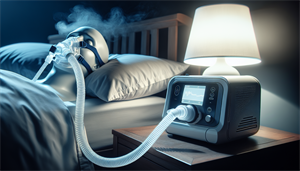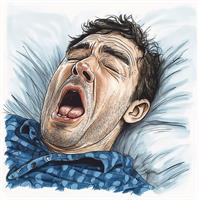If you’re searching for reasons to treat sleep apnea beyond the obvious need for better sleep, you’re in the right place. Treating sleep apnea offers a surprising range of benefits, touching everything from your cognitive functions to your heart health.
Without getting into specifics – that’s what this article is for – rest assured that managing your sleep apnea can profoundly impact your daily life and health. Read on to discover the benefits of treating sleep apnea, leading to positive changes well beyond the bedroom.
Key Takeaways
-
Treating sleep apnea with CPAP therapy improves sleep quality by enhancing REM sleep and reducing fragmented sleep, leading to better cognitive function and emotional wellbeing.
-
Sleep apnea treatment not only promotes restorative sleep but also boosts daytime alertness, cognitive abilities, and reduces the risks of cardiovascular conditions by lowering blood pressure and decreasing the chances of heart disease and stroke.
-
Lifestyle modifications coupled with medical treatments such as CPAP therapy, oral appliances, or surgery, effectively manage sleep apnea, while also benefiting the patient’s bed partner’s sleep and lowering the risks of accidents due to improved alertness.
Improving Sleep Quality

Undergoing CPAP therapy for sleep apnea can significantly enhance your sleep quality. This allows you to greet each morning feeling revitalized and eager to face the day’s challenges. CPAP therapy enhances REM sleep and reduces fragmented sleep, two crucial aspects of sound, restorative sleep.
After all, don’t we all deserve a good night’s sleep?
Enhanced REM Sleep
REM sleep is essential for:
-
Memory consolidation
-
Emotional processing
-
Brain development
-
Dreaming
Obstructive sleep apnea, a form of sleep disordered breathing, can have a disruptive impact on REM sleep. However, consistent use of CPAP therapy can enhance the quality of REM sleep, leading to improved cognitive function and emotional wellbeing.
Isn’t it amazing how treating a sleep disorder can lead to such profound improvements in our daily lives?
Reduced Fragmented Sleep
Fragmented sleep, characterized by constant interruptions during the night, can lead to sleep deprivation and daytime sleepiness. It can even contribute to weight gain.
Sleep apnea treatments, such as CPAP therapy, can reduce the number of awakenings during the night, leading to a more restful and uninterrupted sleep. Imagine waking up feeling completely rested and refreshed, ready to take on the day with full energy!
Boosting Daytime Alertness and Cognitive Function

Treatments for sleep apnea have dual benefits - they not only elevate the quality of your sleep but also boost your daytime alertness and cognitive abilities. By reducing daytime sleepiness, these treatments allow you to stay focused and productive throughout the day.
Let’s look more closely at how treating sleep apnea can help improve your daytime functioning.
Reduced Daytime Sleepiness
The debilitating effect of daytime sleepiness can impede your productivity and negatively influence your quality of life. Sleep apnea can exacerbate this condition, leading to significant daytime fatigue. However, through treatments like CPAP therapy, you can alleviate daytime sleepiness and regain your energy levels.
Isn’t it wonderful to think of a day filled with energy and vitality?
Improved Memory and Focus
Sleep apnea can cause deterioration of memory, attention, and executive function. On the bright side, enhancing sleep quality via sleep apnea treatments can drastically improve your memory and concentration.
Imagine the boost in productivity and overall life quality with a sharper mind and better focus!
Strengthening Cardiovascular Health

Sleep apnea impacts more than just your sleep and cognitive function - it also imposes stress on your heart. The good news is, treating sleep apnea can strengthen your cardiovascular health by lowering blood pressure and reducing the risk of heart disease and stroke.
Let’s delve deeper into how treating sleep apnea can give your heart a healthy boost.
Lower Blood Pressure
High blood pressure is a common comorbidity of sleep apnea. However, treating sleep apnea can help lower high blood pressure, contributing to better cardiovascular health.
Imagine the relief of knowing that your heart is healthier and stronger!
Decreased Risk of Heart Disease and Stroke
Sleep apnea treatments can decrease the risk of heart disease and stroke by improving oxygen levels and blood flow during sleep.
Imagine the peace of mind that comes with a healthier heart.
Enhancing Emotional Wellbeing

The benefits of treating sleep apnea aren’t merely physical - it can also uplift your emotional wellbeing. By improving your mood and reducing the risk of depression, sleep apnea treatments can contribute to a happier and more positive outlook on life.
Let’s look at how treating sleep apnea can give your mood a much-needed lift.
Mood Improvement
Sleep apnea treatments have a positive impact on mood, helping individuals feel better emotionally. Imagine going through your day feeling happier and more positive. Sounds great, doesn’t it?
Reduced Risk of Depression
Sleep apnea and depression are closely linked. The good news? Sleep apnea treatments can reduce the risk of depression, promoting better mental health.
Imagine the relief of lifting the heavy burden of depression off your shoulders.
Minimizing Snoring and Improving Bed Partner's Sleep

If you share a bed with a partner, addressing your sleep apnea won’t solely benefit you. It can lead to more peaceful nights, thereby enhancing your partner’s sleep quality.
Let’s look at how treating sleep apnea can lead to quieter nights and benefit your bed partner.
Quieter Nights
Snoring is a common symptom of sleep apnea that can disrupt your sleep and your partner’s. However, treating sleep apnea with CPAP therapy can lead to quieter nights, reducing or eliminating snoring.
Imagine the peace and tranquillity of a quiet night’s sleep.
Bed Partner's Benefits
Treating sleep apnea doesn’t just improve your sleep; it can also improve your bed partner’s sleep quality.
Imagine both of you waking up feeling refreshed and energized, ready to seize the day.
Lowering Accident Risks
Are you aware that untreated sleep apnea, also known as obstructive sleep apnoea, can heighten your risk of accidents? This stems from the fact that sleep apnea can result in drowsiness and hindered cognitive abilities. However, treating sleep apnea can lower the risk of accidents, promoting safer driving and improved workplace safety.
Let’s delve deeper into how treating sleep apnea can keep you safer on the road and at work.
Safer Driving
Sleep apnea can increase the risk of drowsy driving, which can lead to serious accidents. However, treating sleep apnea can reduce this risk, leading to safer driving.
Imagine driving with peace of mind, knowing that you are alert and focused.
Improved Workplace Safety
Sleep apnea can also affect your safety at work, especially if your job involves operating heavy machinery or driving. Treating sleep apnea can improve your alertness and cognitive function, leading to a safer working environment.
Imagine being more focused and productive at work, without the constant fatigue and drowsiness.
Lifestyle Changes and Home Remedies
Although medical treatments such as CPAP therapy are vital for addressing sleep apnea, lifestyle modifications and home remedies also hold significant importance in managing the condition. Incorporating healthy habits like weight loss and exercise, along with good sleep hygiene, can help treat sleep apnea, complement your sleep apnea treatments, and improve your overall health.
Let’s explore these lifestyle changes and home remedies in more detail.
Weight Loss and Exercise
Weight loss and exercise can play a significant role in alleviating sleep apnea symptoms. Imagine feeling lighter, more active, and healthier, all while improving your sleep quality and reducing your sleep apnea symptoms.
Sleep Hygiene Tips
Good sleep hygiene is crucial in managing sleep apnea. Here are some tips to help improve your sleep:
-
Stick to a consistent sleep schedule
-
Avoid caffeine and alcohol before bedtime
-
Avoid electronic devices before bed
-
Optimize your sleeping environment
Following these practices can help you get better quality sleep and manage your sleep apnea more effectively.
Imagine drifting off to sleep easily every night and waking up feeling fully refreshed and rejuvenated.
Navigating Treatment Options
Exploring treatment options for sleep apnea can seem daunting. Nevertheless, gaining an understanding of the array of treatments, including CPAP therapy, oral appliances, and surgical interventions, can aid you in identifying the most effective solution suitable for your needs.
Let’s explore these treatment options in more detail.
CPAP Therapy
CPAP therapy, also known as positive airway pressure cpap, is a common and effective treatment for sleep apnea. It works by delivering continuous positive airway pressure to maintain an open airway during sleep.
Imagine sleeping soundly with the help of a CPAP machine, without any interruptions or pauses in your breathing.
Oral Appliances
Oral appliances can be an alternative to CPAP therapy for some people with sleep apnea. These devices work by repositioning the jaw or tongue to keep the airway open during sleep. A CPAP device is another effective option for treating sleep apnea, but some patients may prefer oral appliances.
Imagine getting the benefits of sleep apnea treatment without the need for a machine.
Surgical Interventions
For some individuals, surgical interventions may be considered if other treatments are not effective. These procedures aim to address physical obstructions in the airway.
Imagine finally finding relief from severe sleep apnea symptoms, particularly those caused by obstructive sleep apnea, and enjoying a good night’s sleep.
Summary
Treating sleep apnea can significantly improve your quality of life, from enhancing your sleep quality and cognitive function to strengthening your cardiovascular health and emotional wellbeing. By embracing treatment and making the necessary lifestyle changes, you can manage sleep apnea effectively and live a healthier, happier life.
Frequently Asked Questions
What are the benefits of being treated for sleep apnea?
Being treated for sleep apnea can improve your sleep quality, reduce daytime fatigue, and lower the risk of serious health conditions such as heart disease and stroke. It is beneficial for overall well-being and long-term health.
Symptoms of sleep apnea?
If you are experiencing loud snoring, restlessness during sleep, feeling excessively tired, and fitting the profile, these could be symptoms of sleep apnea. Seek medical advice if you notice these signs.
How does CPAP therapy work?
CPAP therapy works by delivering a continuous positive airway pressure to keep the airway open during sleep, improving sleep quality and reducing sleep apnea symptoms.
What lifestyle changes can help manage sleep apnea?
Making lifestyle changes such as weight loss, regular exercise, and maintaining good sleep hygiene can help manage sleep apnea effectively.
Are there alternatives to CPAP therapy for sleep apnea?
Yes, oral appliances and surgical interventions can be alternatives to CPAP therapy for some people with sleep apnea. Consider discussing these options with your healthcare provider to find the best solution for your needs.


